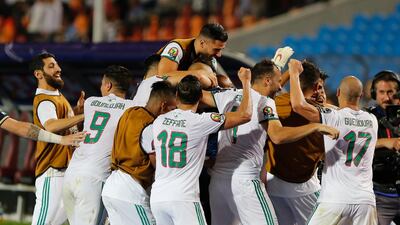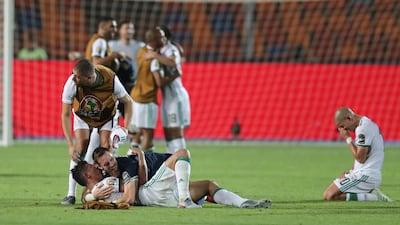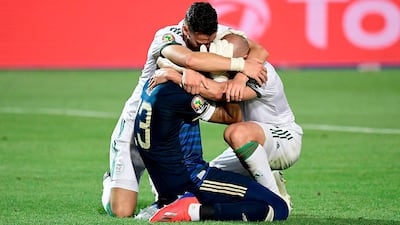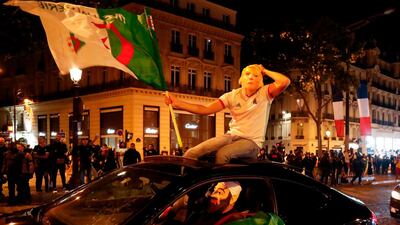The planes have been readied, visas issued and, by Friday afternoon, at least another 5,000 Algerians will have flown in to Cairo to join the estimated 3,000 compatriots who have chanted the national team towards the final of the Africa Cup of Nations.
They may not be numerous enough to outshout everyone else at Friday’s confrontation with Senegal, but indications are that many Egyptians in the crowd will ally for the day with their fellow North Africans.
Given the rancorous history between Egypt and Algeria, that counts as startling. Among the more poignant aspects of Algeria’s progress to within 90 minutes of a second Nations Cup triumph is the setting. Egypt, and especially Cairo, has been the site of dramatic flashpoints in the often tempestuous history of Algerian football.
Behind the scenes, some officials saw one blessing in the host country's shock early elimination from this Afcon - beaten by South Africa at the last 16 stage - because it meant a possible Egypt-Algeria semi-final was avoided.
The last time they met at a Nations Cup, three Algerian players received red cards. That was in 2010, the hot tempers a symptom of a seething rivalry that had been inflamed by four high-stakes collisions in the space of seven months.
Egypt went on, after that 4-0 semi-final victory over eight-man Algeria, to win the 2010 Nations Cup, but an equally valuable prize of that year, a place at the World Cup, had already been denied them - by Algeria.
The countries met three times in qualifying for that World Cup, an epic saga that required a play-off because the countries had finished tied at the top of their group thanks to a 2-0 Egyptian win in Cairo, with the crucial second goal scored five minutes into injury time.

This after Algeria’s team bus had been attacked by fans, three players inside it reporting wounds as a result. Rafik Halliche, the defender and a member of the current squad, took to the field with his head bandaged because of injuries he said had been sustained from missiles shattering the windows of the bus.
The violence spread. The Egypt Air office in Algiers was vandalised and in the days between the Cairo match and the tie-breaker play-off, staged in Sudan and won 1-0 by Algeria, diplomatic relations between the two governments were all but severed.
Nor were they entirely easy before these clashes.
Truth is that football has for decades soured Algeria-Egypt relations, all the way back to Egypt’s refusal, unlike other post-colonial Arab states, to host and play against the fabled Front de Liberation Nacional team, formed of Algerian professionals as part of the independence struggle against French rule, in the late 1950s.
There is more. Like the infamous battle of Cario in 1989, when Egypt won a World Cup qualifier that took the Pharaohs to the 1990 World Cup at Algeria’s expense.
The brawling after a fiery encounter left a member of the Egyptian sport staff blinded in one eye, after what was reported as an attack with a bottle by the Algerian star Lakhdar Belloumi. Belloumi denied the charge, but for 20 years had his name on an Interpol warrant because Egyptian police wanted him for questioning.
That episode, in turn, led Egypt to send a weakened, reduced squad to Algeria for the Cup of Nations the following year. They were long gone from the tournament when Algeria celebrated their first, and so far only, triumph in the competition - to no cheers at all from the eastern end of the Mediterranean.

Yet for all this toxic history, there were clear signs that long-held grudges have healed.
Many Egyptians in the audience for Sunday’s semi-final between Algeria and Nigeria were noisily rooting for the so-called Desert Foxes. Not all of them, but enough that a degree of pan-Arab allegiance, of unity, could be deciphered.
Both these countries have suffered, socially and politically in recent years. The hosts of this Nations Cup have a keen sense of what reaching the final means to millions of Algerians.
Manager Djamel Belmadi knows it keenly. Belmadi the player lived through some highly-charged occasions with the national team, not least the notorious match in Paris against France in 2001, an event designed to act as a symbolic rapprochement between two nations who spent a portion of the last century in a horrific war.
That game was abandoned before the final whistle because of a pitch invasion, led by Algerian supporters.
On Friday, in once-hostile Cairo, Belmadi the manager will welcome the plane-loads of loyalists. He has made them a promise.
“I am not a politician,” he said, “and I am not a miracle worker or magician. But I can say for sure we will push ourselves in this final as hard we have pushed to get here.
"We will give our maximum.”















